You should watch the 1990s video of Leonard Bernstein conducting the New York Philharmonic Orchestra playing the Symphony #4 by Tchaikowsky as soon as you can but you have to do it before mid-day July 16, 2021 when the New York Philharmonic’s webpage will replace it with another performance.
(https://www.carnegiehall.org/Calendar/2021/07/09/Carnegie-Hall-Selects-Tchaikovskys-Symphony-No-4-1200PM#live),
The sound is far from optimal, even fading in and out a few times, but the magic of the piece and of the performance are both still there and more than compensate for any shortcomings of technology as well as for the passage of time.
Often, in the 1st movement , the sound seems to thunder directly from the tip of Bernstein’s baton. The sweet moments are like sipping the most delicious ice-cold vodka, unmatchable. At the end of the first movement, with lightning interspersed between the most beautiful of melodies, you are exhausted. By the end of the second movement, however, you are in a relaxed and calm sea, made ready for the staccato beginnings of the gentle third movement. Watch Bernstein’s face here for elfin moments of satisfaction. Has there ever been another conductor 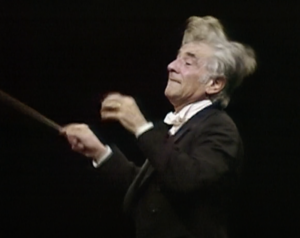 whose expressions mirrored the music the way Bernstein’s did?
whose expressions mirrored the music the way Bernstein’s did? 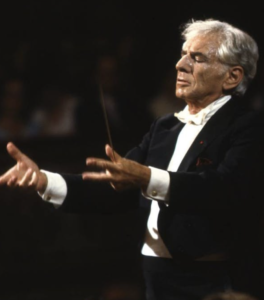 Then the final parade of the last movement, the power of a triumphant army sweeping away all that came before it.
Then the final parade of the last movement, the power of a triumphant army sweeping away all that came before it.
But it wasn’t only the majesty of the music and the excitement of once again watching Bernstein exult with the sounds he brought forth that filled my head.
Imagine yourself sitting in the last row of the balcony of a grand concert hall, able to see everything contributing to the experience. How did it start? Where did the people come from?
How many eons ago did some primitive pre-human hear the sound of a bird sing? Was it that cave person who took the earliest step to music? How many times did the Earth revolve around the sun before a rock hitting a rock became a drum? Did some ancient creature try to blow the rotting core from a tree branch and make a horn? Perhaps an accidentally-strummed tendon led to a lute, a violin, a piano?
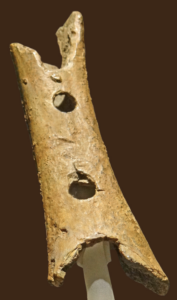 The oldest musical instrument in the world is a 60,000-year-old Neanderthal flute discovered in a cave in what is now Cerkno, Slovenia. But that is the oldest discovered, not the oldest. From pre-history to Cerkno and then on to Carnegie Hall. That is the journey.
The oldest musical instrument in the world is a 60,000-year-old Neanderthal flute discovered in a cave in what is now Cerkno, Slovenia. But that is the oldest discovered, not the oldest. From pre-history to Cerkno and then on to Carnegie Hall. That is the journey.
The first individual identified as a musician is Jubal (or Yuval or Yubal) (painting by Kristian Zahrtmann, 1878), in Genesis 4:21 of the Hebrew Bible. Jubal,
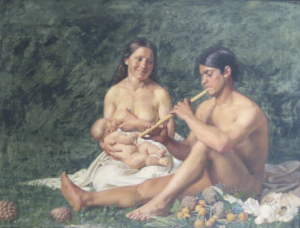 descended from Cain, is said to have played the kinnor, a harp or a lyre, and the uggab, a flute or a pipe. He is called “the ancestor of all who played the hart and flute.” The identity of the first person to actually make a musical sound can only be imagined.
descended from Cain, is said to have played the kinnor, a harp or a lyre, and the uggab, a flute or a pipe. He is called “the ancestor of all who played the hart and flute.” The identity of the first person to actually make a musical sound can only be imagined.
Peering down at the stage from your virtual seat you can see Jubal’s own descendants: the diverse array of humans in the modern orchestra. Men, women, white, black, brown. So many countries of origin. So many religions. So much talent!
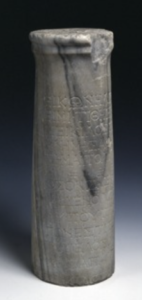 The oldest surviving complete musical composition is the ‘Seikilos epitath’ dating from the 1st or 2nd century, C.E. The Hellenistic Ionic song was found engraved on a tombstone (a stele) from the Hellenistic town of Tralles, close to Ephesus.
The oldest surviving complete musical composition is the ‘Seikilos epitath’ dating from the 1st or 2nd century, C.E. The Hellenistic Ionic song was found engraved on a tombstone (a stele) from the Hellenistic town of Tralles, close to Ephesus.
We could talk about Tchaikowsky and his often tortured life. About his pointless marriage and his 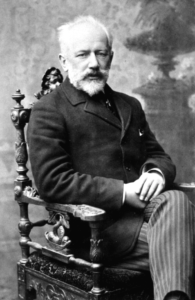 thirteen-years-long correspondence with Nadezhda von Meck, a woman he never met who became his devoted patron. About his homosexuality, which he kept hidden. But all that, and more, is for another time …
thirteen-years-long correspondence with Nadezhda von Meck, a woman he never met who became his devoted patron. About his homosexuality, which he kept hidden. But all that, and more, is for another time …
We could also talk about Bernstein and his affinity for tortured composers such as Tchaikowsky and Mahler. About his storybook ride to fame and fortune. How he gave up composing popular works after his mentor, Serge Kousevitsky told him to write only classical music, advice he ardently followed until Kousevitsky died and Bernstein then composed “West Side Story,” “Candide” and other Broadway shows, as well as symphonies. About his conducting the Beethoven Ninth Symphony at the fallen Berlin Wall. About his political activism. About his bisexuality. But all that, and more, is for another time …
For now, enjoy this marvelous performance.
https://www.carnegiehall.org/Calendar/2021/07/09/Carnegie-Hall-Selects-Tchaikovskys-Symphony-No-4-1200PM#live
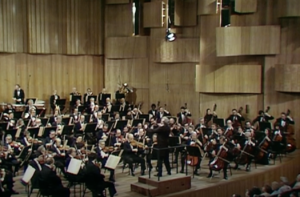
July 14, 2021 at 12:42 pm
Was Bernstein perhaps a little too aware of how he came across to people watching him conduct? Toscanini scarcely moved a muscle!
July 18, 2021 at 1:54 pm
Toscanini and Bernstein are certainly polar opposites, in many ways. They each brought extraordinary gifts to us all. Have you read the wonderful 2017 biography of Toscanini by Harvey Sachs? Worth the time.
July 14, 2021 at 12:58 pm
Love the painting of the natural family unit of the first identified musician, the lute player with woman feeding her child. Music and love!
July 14, 2021 at 1:11 pm
Thank you for the tip about this performance’s deadline!
As to the oldest musical instrument, I would say the best one is the human’s vocal cords. The rest followed, with some trying hard to emulate, like the violin
July 14, 2021 at 2:39 pm
Thank you for sharing
another text with pearls of teachings
Best
July 14, 2021 at 6:00 pm
Thank you Dr. Geller for sharing this Magical music and performance!!
July 14, 2021 at 7:08 pm
I loved the smile on his face as the piccolo player played the very intricate part several times. I bet he didn’t do it perfectly on rehearsal. The genius of Tschaikovsky came through Bernstein’s brain to every muscle of his body and it flowed out to the musicians of the orchestra who followed his every gesture perfectly. Thank you for the link.
July 15, 2021 at 4:14 am
Thank you for the enlightenment, both musical, and historical.
I have just concluded a lengthy conversation with my 97 y.o. mother, an intellectual, (PhD from the Sorbonne), an avid reader, who is going into apathy, abandoning interest in mind stimulating topics.
This post made me reflect on the wealth of knowledge, the superiority of the human brain, and the tragedy of its deterioration.
There is such an ocean of wealth in human creation. There is such a loss when becoming incapable of taking advantage of it.
Thank you.
July 15, 2021 at 7:03 pm
Well done as usual, Stephen. Cancer well controlled but some difficulty typing so this will be short.
July 15, 2021 at 11:00 pm
Thanks for the heads up. It was a sensational performance, so greatly enhanced by the spectacular photography and the ability to register the extraordinary energy that Bernstein poured into it!
I felt sorry for the audience that missed that close up detail of the musicians and especially the expressiveness of Bernstein’s conducting.
As for the oldest instrument, I’d vote for the drum.
July 19, 2021 at 2:49 pm
Hi Dr. Geller, thank you for sharing your latest essay. I did not have a chance to read it till now (7/19) but just looked at the link you provided and very fortunately they have not yet
removed the video so will be listening to it today. Very interesting story about his transition from classical to Broadway. I did not know that.